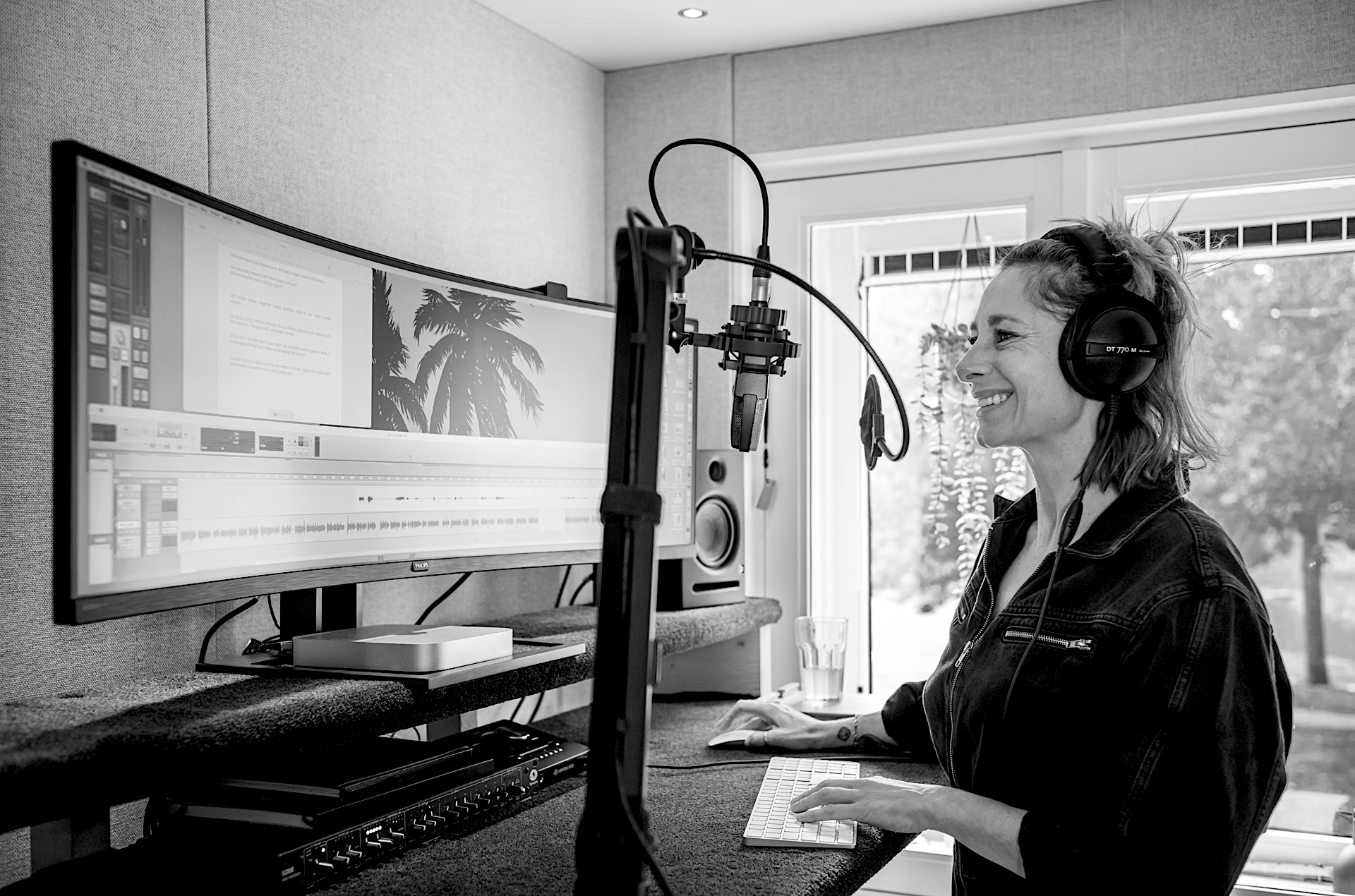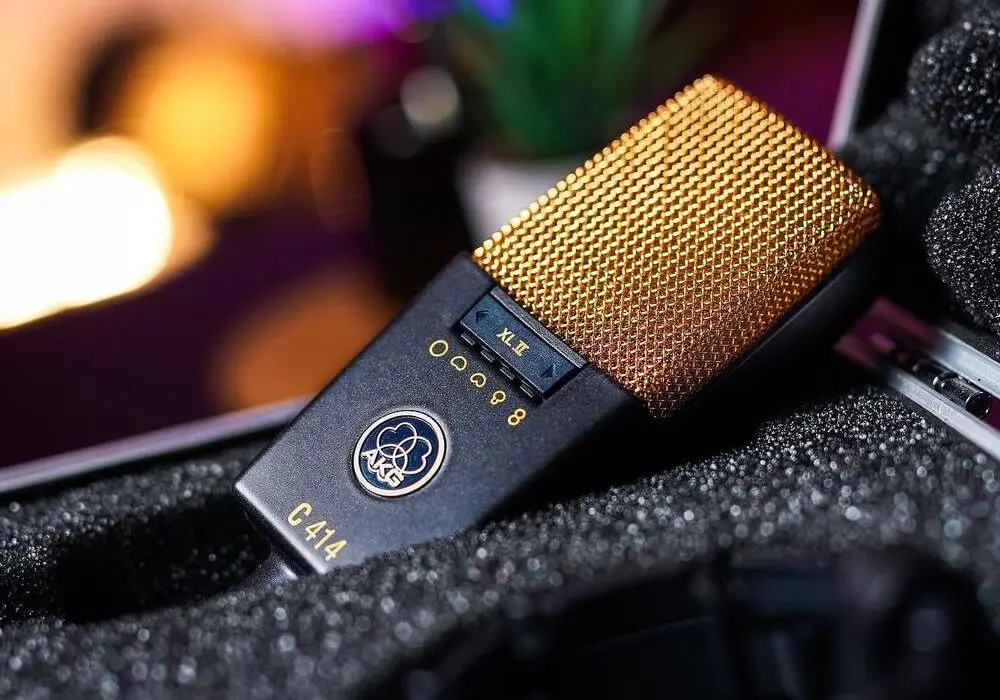You would like to become a Voice Over, but how do you go about it? This is how!
It’s a dream job. Being your own boss, setting your own hours, working from home, being creative, talking a lot. All of 2024. That sounds good. And yes, it is. So you too would like to become a Voice Over.
Anyone can handle a computer and anyone can buy a microphone. It can’t be that complicated, can it? And yes, it’s an insanely cool, varied profession and if you do it well you can make a nice living at it.
So I regularly get the question “How do I actually become a Voice Over?
But alas, I don’t host people at my studio and no, I won’t have a cup of coffee with you either. Not even a call, sorry. Not because I wouldn’t want to in terms of friendliness, but simply because I don’t have time for that.
My beautiful family, my dear friends, family and my toko deserve all my attention and with that my time is up. Indeed, I have too little time. What I can do is tell híer you can become a professional Voice Over. Then only from my own experience, of course there are more roads leading to Rome.
Ok, here we go. Step 1, become the test phase for voiceover.
A Voice Over has a pleasant voice to listen to, but if you want to become a professional Voice Over, you will also need to have a talent for text perception. In other words, sensing a text. After all, just because you have a fine voice does not at all mean that you can tell a text nicely, well and believably. Annoying, but that’s how it is. Therefore, text perception is just as important as a fine voice.
If you lack any of these skills, then you can shake it.
Then, of course, there are various disciplines within the voice-over profession. So you can voice audiobooks, cartoons, commercials or serve the corporate market. There are numerous directions you can go. Birst think for yourself where you would like to start and try it out. Pull a practice script from the Internet or grab a newspaper, sit down in front of it with your phone and record yourself. So read aloud, doesn’t really matter what kind of text. Try at your very best to tell the text the way you think it should sound when you are Voice Over or voice actor later. Listen back to that recording.
Well what do you think? Does it sound a little “tasty” and “believable and natural”?
And yes, of course it is true that in the beginning you have to learn all kinds of things. But “telling a story (short or long) believably and naturally” is also something you have to naturally sense. Empathy AKA text perception, if you don’t have a talent for it you’re never going to learn it. It’s as simple as that. Just like I can’t become an accountant, me and numbers is really a crime.
Tip, and you really should do this one: Let other people hear your audio file!
Then especially ask them to please be sincere and critical, because friends always say it sounds good anyway, even if it’s totally jerk…..Gelieve your own story? And those others too? Are you still convinced that you want to and can become a Voice Over?
Now you are ready for step 2, practice.
If your friends tell you that you really need to start doing something with it, then you start practicing, a lot of practicing. So print out even more different kinds of scripts and really get down to it. Not once, but a thousand times. Record yourself and listen back until you drop and be critical of yourself. Improve and get well. You can’t enter the market without already being somewhat good and experienced, because then you simply won’t get booked. The Voice Over world is a fast-paced market, the client has no time to manage newcomers yet. If you really want to become Voice Over, you have to nail it right away. If you start badly they are definitely not going to book you in the future.
If you have practiced vigorously, you can do a voice-over workshop.
For the people in the Netherlands: With Ruby, a very professional Voice Over and delightful woman who offers customized training. You can also sign up at voiceovercollege.nl or voice-acting.nl, where you will find awesome and professional workshops.
It may seem like a big investment, but besides being fun to do, it also reveals whether you have real talent. Maybe it won’t end up in what you want to hear, but then again, you know that, right?
Such a workshop is good because you are there with several students of the same level and you can compare nicely and unabashedly. Am I really that good or that bad? And how do others do it? It is inspiring and educational. The voice-over profession is all about experience and making meters, so the more you pitch in the better. With most workshops, if all goes well, you get a demo of your voiced work afterward that you can then use to move forward to become a voiceover.
By the way, I did not do a voicing workshop, but had the necessary experience from my MTV time, my radio show at 3FM and as stationvoice of NPO3. So my first practice meters I had already turned fairly well.
Note! Don’t think that you can immediately start working as a professional Voice Over and the jobs are pouring in.
You might have expected that doing a course would have you mastering all the intricacies of the trade in no time. And that you would be handed on a silver platter how to build a good studio (for next to nothing) and what microphone you need. Hup, get to work the next day right? But unfortunately, that’s not how it works. Let me explain.
Again, as a Voice Over or voice actor, it is important to practice and keep practicing your ass off.
Reviewing commercials, recording and listening back to scripts, varying voice tone, intonation, loud, soft, doing typing. Getting comfortable with your own voice as well as hearing what you are doing. I too, after years of experience and endless different types of assignments, still practice, listen and learn. Your voice is an ingenious instrument. If you want to become a Voice Over with your own studio and seriously serve the market, you need to know your voice inside out and play it perfectly. Just like singers and vocalists.
If you want to become a Voice Over with your own studio, you must practice not only with your voice, but also with your ears!
It is crucial that you develop your hearing so that you hear what you are doing. And, of course, that’s not just in flawless voicing. The smallest nuances in the use of your voice (read: intonation, tempo, power and flow) make the biggest difference.
The only way to develop that is to make even more meters. So in the beginning of my homestudio adventure, I spent night after night into the wee hours learning how to use and play those instruments.
Compare it to playing the piano, or any other instrument. You will have to practice your butt off to get good at it and get a blind feel for it, because generally you work all by yourself.
So put it on. Practicing is the most important step. If you don’t want to go for this it will never be anything.
If you have completed Step 2 properly, then you are ready for Step 3a and/or 3b.
A topper you are, you practiced, listened back and with tears in your eyes pushed yourself to the limit. You want to become a full-time Voice Over, you really have a nice flow now and you are ready to go out into the wide world. Hooray. But now what? Are you going to make a decent demo first (3a) or are you going to build a studio right away (3b)?
I would go for 3a. First, a good professional demo. If you don’t have one yet, it’s smart to do so with someone who knows about it, a well-known studio you may have worked for before, for example.
Should you feel you can do it yourself, go for it. I made my first demo at a studio for which I had already voiced a few assignments. He did want to help me make a full demo. Since I did not have my own studio at that time, I was able to record some additional material with him. We mixed that with the assignments I had already done. That’s how I got a good professional first demo.
You can also choose step 3b first: build an audio studio right away.
Okay, with me it went like this: because I did voice-over work on location in my 3FM and MTV days, I was already a little known in the scene. And I was also the station voice of NPO3. Since I was at home with two small children, I did build my home studio right away, because I couldn’t just go out the door. That was definitely a gamble, because I didn’t have a whole lot of work yet. But since I didn’t know what else I could do, it was the best choice at the time.
The quietest room in the house became the place for it to happen, and there I built a vocal booth with a friend. You can make it as crazy as you want, of course. You can have a studio built if you have budget, but I didn’t have a big budget so built it myself. A double-walled cabin of about 130x130x230 made of Gamma MDF boards and glass wool. Then I installed Auralex foam on the inside, put good flooring on the floor and made a nice double-walled door. It was still a big job, but it worked.
Just a little side note: building a cab yourself is tricky though, because if you’re unlucky it won’t sound like anything.
Becoming a voice over is not easy. You have to produce good sound on all fronts. And so think carefully about your material, construction and where you put it. Sound is a special phenomenon. The soundproofing of your cubicle is half the trick, the acoustics you create the rest of the recipe. I was lucky, my homebrew vocal booth had a nice dry sound right away. Little to no noise or weird side noises and no indeterminate reverberations. Then I had a topnotch audio engineer flown in to have the acoustics optimized. He said I was fine with that booth of mine. Nice, because for about €1000 (2011) I was another step ahead.
Now to the technology.
This is tricky because each Voice Over or voice actor has his/her own preferences in terms of MiC, pre-amp, interface and audio program. Some like this to work, others like that. Since I really had no idea what would work for me, I bought practically the same set that a helping colleague in the profession also worked with. I ordered everything from thomann.de, but you can also do well at Baxshop.
What I bought. MiC: the Neumann TLM102. Reasonably affordable and sellable should it turn out to be nothing. The MiC worked fine for that moment, I could do with it. Lucky again. Now I do have a new MiC because I was ready for the next level, but that Neumann was a perfect start.
 Then I also have the Symetrix 528E voice processor. Then no idea what to do with it, but I had it beautifully. As we speak, it is still here and, of course, I do know exactly how it works. I figured that out with the help of internet tutorials.
Then I also have the Symetrix 528E voice processor. Then no idea what to do with it, but I had it beautifully. As we speak, it is still here and, of course, I do know exactly how it works. I figured that out with the help of internet tutorials.
I also work with Apple, a Universal Apollo Twin interface, a JZ pop filter and, of course, snazzy cabling. Don’t buy cheap junk, because you can get crackles, ticks and noise. And I’m running on the latest Protools. All in all, the home studio then (2011) was an investment of 5000,- I think.
But whaaaaaaat the f*ck is all this now? I didn’t understand a thing. Suddenly you’re sitting there with your studio that you actually have no idea how it works….
I wanted to be Voice Over, but shit…now what?
First, I searched the Internet for “Protools and audio engineering classes. Nothing to be found, of course. Yes well by the way, in Amsterdam I found some kind of workshop for audio technician, but it was too extensive and too expensive for me. My money had run out.
There was nothing to do but teach myself the technique. So all the hours I had left (and actually didn’t have with 2 small children) I started installing, messing around and watching youtube tutorials. It became a battlefield. It was so darn complicated. I thought I would never learn. Tears, swearing, and angry moments where I thought:
“Fuck that Voice Over being, I’m selling the place again!”
Fortunately, I had a friend who helped me out in case of emergency, and that’s how things worked out after all. Although it did take some time before I could do anything at all with my studio and nothing kept messing everything up. By now I am a Handy Harry with my studio gear.
If you want to have your own professional audio studio, you need to be really driven or have someone to assist you (online) if needed. Als you don’t want to build a studio for a while after this story, make sure you can record at a good studio near you. Who knows, you might just have a job coming in and need to be able to move quickly.
Yess, demo and studio are done, on to step 4!
And now the “behind-the-scenes” work begins. That too can be a hefty task, unless you enlist (paid) help. If you want to become a Voice Talent Become and make a living at it then you really need a cool website and a network. Because yes, people need to be able to hear that demo somewhere, of course. In doing so, it is nice if people can read something about you, what you stand for, what you can do.
I built my first website myself. Fortunately, I was pretty handy with that and the competition was not as cutthroat as it is now. The site (a one-pager) did what it was supposed to do. It was clear, fresh, looked pretty good and I was reasonably findable. Anno 2024 is a bit more complicated, though. Competition is fierce.
After all, with you, there are 100,000 more people who are or want to become Voice Over.
So think considerably about the structure of your site, texts, images, blog, references, social media, SEO, etcetera. Your site must be good and professional on the front end as well as the back end, or no one is going to find you online. I also recommend an SEO check and Adwords campaign. Delve into that yourself so you know what it’s about.
You can also choose not to build a site and put everything on a channel such as TikTok, youtube, soundcloud or vimeo . I just don’t think that works, because again with you many others so make sure you are easily findable everywhere! How you will present yourself online is of course something you have to decide for yourself but believe me, nowadays your site as well as social media is your business card, so it better be good!
Demo and site ready? Networking then! Step 5.
“Very cool that demo, studio and site, but I want action now actually, I want to become and be Voice Over! Bring on those assignments!”
I totally get that. Therefore, here are some helpful tips for getting in between. Although these do not guarantee success.
What you can do is the following: go to google and you search for: web video, advertising agency, audio production, voice-over, all the keywords you can hang a voice-over on. Create a list of email addresses of people and companies who work with Voice Overs.
When you have at least 50 you start mailing. Just very oldskool acquisition. A lot of time goes into that, but that’s how I did it. And I also approached everyone with a personal touch, so no bulk mail but just a sincere personal header and a good story with your demo attached. ‘Hmmmm, no responses…yes a few. Hmmmm, what did I do wrong?
Well, it did take me a while to get the first application.
And when I received it, I was very happy, but also blood nervous. All of a sudden I had to do it for real in that studio by myself. It was only a small job, but still. Suddenly I began to doubt myself enormously. I plowed myself through it and sent the audio a day later…silence. I didn’t get anything back. I had to wait two days until I received the redeeming email that they were very happy with my work.
Woopwoop! I could do it!
I had succeeded. Between the time the first screw went into that vocal booth and the first official home assignment were about 8 months of misery. I had run out of money and had yet to learn all the techniques, but apparently I had the basics down and that was good news. It gave me renewed courage and I continued to practice and network.
You can also email voting agencies directly. If you google you will come across zat, such as Voicebooking, Voices Industries, Post Office Voice casting. Pick a few that you think will suit you and send your demo, see what happens. Én no way pay for a registration, which is total crapp. If they want you there and think they can do business with you, they really don’t ask for a registration fee.
With me, things went differently. In fact, I received an email from Voicebooking itself. Whether I wanted to join their club. That caught me by surprise, because I hadn’t seen that one coming at all I had just started, but of course I wanted to. I could not have wished for a finer confirmation of my talent.
The ball really started rolling. The first assignments came in and the first year as a Voice Over with its own studio I was turning over almost minimum wage for a 19-year-old. ‘Wow, that’s actually not that much at all,’ I hear you thinking now. No definitely not. Not at all because as a self-employed person you do not have or accrue social insurance, vacation pay or other benefits. But I thought it was quite a lot, because before that I had nothing.
And then the last one. Step 6: Update and keep evolving.
Once the momentum took hold, I always continued to invest and develop. That’s really MEGA important. Don’t think that once you’re in between and your assignments flow nicely, that it will stay that way. Competition is cutthroat even if you already have work.
For example, a year after I created my own website, I had one made, a comprehensive and really professional one. And yes that cost another bucket of money. Incidentally, though again to its own design, but technically a lot more sound. Two years later, I had that site upgraded again.
Since Jan. 2024 I have been open with the website you see now, my fourth so in 10 years. Totally conceived and made by myself with again hours of practice and watching tutorials. And fine technical support from Layla from yourimpactonline. The Internet evolves constantly and if you want to keep up, your website must always be up to date.
I outsource GoogleAds and my back office to Anne Martin of Uildriks Management, because he can do that much better. Then I can focus full-time on the creative part, because that’s what I’m good at and what makes me happiest.
In addition, of course, I keep a close eye on vocing trends by regularly watching an evening TVcommercials instead of Netflix and parroting.
In addition, I use the rest of my time (when I’m not pitching in) to work on my business, entrepreneurship that is. I exercise a lot and regularly skip parties to keep my voice in top condition. Now, more than ten years after the kick-off, I can say definitively, I nailed it to the max!
Conclusion: In just 6 steps, you can become a successful Voice Over!
For example, I speak in daily and have many repeat clients. AND, most importantly, I am always there for my children, because that’s what I was all about. But it was a lonely rollercoaster ride. Filled with frustration, tears, half a burnout, an empty bank account, but also a good dose of endurance, the necessary help and a few fluke.
And this is kicking, for a few years now I’ve had the very thickest voice-over home audio studio in the country. Totally custom-made to my requirements, ultra soundproof and of course topnotch acoustically. Box-in-Box as it is called a room within a room. Double doors, windows and a floating floor so it makes no contact with the house. Made by professional high-end studio builders. Yes, it did cost some serious money, but I had earned it. I tried my hardest for that for 10 years.
So, this is my whole story.
So “becoming a voice-over” is quite a tough job.
But gas up that lollipop and it can be done! I hope this is of some use to you. That I was able to make it clear to you that it was a tough job and at the same time the best work adventure I have done. You just have to really invest in it. In terms of both time and money.
Bon, I’m glad I went for it this way and never want anything else. #heartspeech, maybe I should just get that tattooed on my arm.
Cheers and good luck ya’ll!
Barbara
And do you want to know what it’s like in my kickass studio? Check out my studio vlogs here.
Share this post:
Automatically read along? Subscribe to VOICELAND and receive a tasty VOICE story every QUARTERLY.




